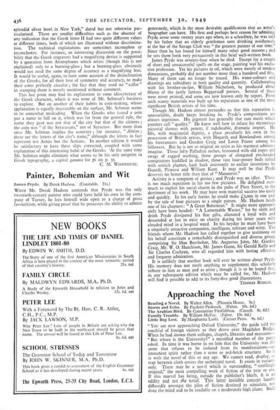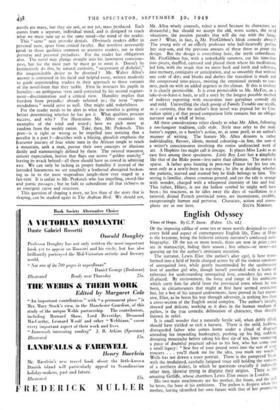Approaching the Novel
Storm and Echo. By Frederic Prokosch. (Faber. 10s. 6d.) The Arabian Bird. By Constantine FitzGibbon. (Cassell. 8s. 6d.) Family Trouble. By William McFee. (Faber. 10s. 6d.) Little Boy Lost. By Marghanita Laski. (Cresset Press. 9s. 6d.)
"You are now approaching Oxford University," the guide told the coachful of foreign visitors as they drove over Magdalen Bridge. When he had shown them colleges, chapels, libraries and museums- " But where is the University?" a mystified member of the party asked. In time it was borne in on him that the University was the atom that refuses to be isolated from its manifestations—an immanent spirit rather than a stone or red-brick structure. So it is with the novel of this or any age. We cannot read, display, oc trap between cloth covers the archetypal novel. It exists in variant; only. There may be a novel which is outstanding, " startlingly original," the most compelling work of fiction of the year or era. If this marvel has being, outside the publisher's blurb, it is an oddity and not the novel. This latter invisible concept haunts diffusedly amongst the piles of fiction destined to stimulate, not drug the mind and to be readable on a moderately high plane. Such novels are many, but they are not, or not yet, mass produced. Each comes from a separate, individual mind, and is designed to reach what we must sum up as the same mind—the mind of the reader.
This " same " may provoke denials. Obviously readers differ in personal taste, apart from critical faculty. But novelists necessarily weak to those qualities common to attentive readers, not to their perverse and personal prejudices. For the reader has obligations also. The novel may plunge straight into his innermost conscious- ness, but for the most part he must go to meet it. Doesn't he instinctively do this, by natural curiosity, " suspension of disbelief," the unquenchable desire to be diverted ? Mr. Walter Allen's answer is contained in his lucid and helpful essay, written modestly to guide unpretending readers in their approach to those variants of the novel-form that they tackle. First he instructs his pupils in humility—an ambiguous term until corrected by his second require- ment—discrimination and a critical view. Humility implies that freedom from prejudice already referred to ; the term " open- mindedness " would serve as well. One might add, wakefulness.
For the reader needs to be alert to what the novelist is getting at before determining whether he has got it. What qualities procure success, and why ? For illustration Mr. Allen examines six examples of the tried and tested ; here we pick more at random from the weekly ration. Take, then, Mr. Prokosch. This poet—is it right or wrong to be impelled into noticing that a novelist is a poet ?—describes with a blazing, ghoulish emphasis the fearsome journey of four white men in the African jungle to reach a mountain, seek a man, pursue their own concepts or illusions darkly and stammeringly defined by them. The twisted tenseness, sinister expectation, horror that flaps out across "golden anarchy_" leaving its wrack behind—all these should have us cowed in admiring awe. We can only be lacking in proper humility if instead of the intended lineaments we see naughtily a feathered aboriginal beckon- ing us in to the most stupendous jungle-show ever staged in a fair-tent. It is unfair to Mr. Prokosch who has impelling, sword-like and poetic passages ; but he fails to subordinate all that richness to an emergent curve and structure.
This question of shaping a story, no less than of the story that is shaping, can be studied again in The Arabian Bird. We should not, Mr. Allen wisely counsels, reject a novel because its characters are distasteful ; but should we accept the old, worn scenes, the tired situations, the passion parades that will die out with the hang. over ? What, in fact, is.Mr. FitzGibbon's bleak comedy about ? The young wife of an elderly professor who half-heartedly prefers her step-son, and the previous amours of these three to point the design. But the design is everything here, the myth subordinate. Mr. FitzGibbon has, with a remarkable sureness, cut his time-line into pieces, shuffled, caressed and placed them where his meditations led him, with the result that we move back and forth and sideways, into memory, contiguity or anticipation, and so smoothly that without any code of dots and blanks and dashes the transition is made and the compressed time-pieces, twisting the emotional strands to taut- ness, push on with an added urgency to the climax. If this is trickery it is clearly permissible. It is even permissible to Mr. McFee, on a take-it-or-leave-it basis, to tell a story by the longest possible method of indirect reporting with excursions into garrulous comedy old and mild. Unravelling the slack gossip of Family Trouble one recalls, as a curiosity, that the author's first novel was praised for its Con- radian spirit ; of that proud comparison little remains but an oblique narrator and a whiff of brine.
All these considerations relate closely to what Mr. Allen, following a too-fungusy tradition, calls style. Style may refer to the mad- hatter's topper, to a bowler's action, or, at some peril, to an author's manner of writing. The feature Mr. Allen denotes is rather individuality, flavour, idiom, mental colouring—in fine, the sum of a writer's consciousness involving the entire undissected work of art. A Hopkins fan might call it inscape. It places Miss Laski as an easy first among these specimens. Little Boy Lost has a simplicity like that of the Blake poem—less naïve than ultimate. The matter is sparse. A father goes hunting in post-war France for his lost son, seen only as a newly-born in war-time ; he jibs at deciding whether the pathetic, starved and stunted boy he finds belongs to him. The setting is familiar, almost common ground, and yet the tale is strange with wonder, charged with a whispered intensity of fair and foul. This father, Hilary, is not the hollow symbol he might well have been ; his reactions, as he idles away the days of vacillation in a tattered, dismal French provincial town, are inconsistent, credible, exasperatingly human and perverse. Character, action and atmos-















































 Previous page
Previous page